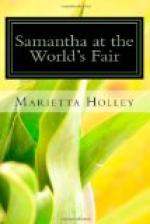“Mornin’ by the Sea-shore,” “Breakfast in the Country,” and “The Laundress of the Mountain.”
“Christ and the Children,” by Julius Schmid, wuz beautiful as could be.
And so wuz “The Death of Autumn,” by Franz Pensinger—they held in ’em all the sadly glorious beauty of the closing year.
“The Three Beggars of Cordova,” by Edwin Weeks, wuz dretful interestin’.
Them tramps set there lookin’ so sassy, and lazy, nateral as life. Lots of jest such ones have importuned me for food on my Jonesville door-step.
[Illustration: Them tramps set there lookin’ so sassy and lazy, nateral as life.]
Then he had two Hindoo fakirs that wuz real interestin’. The fur-off Indian city, the river, and the fakir a-layin’ in the boat, tired out, I presoom, a-makin’ folks stand up in the air, and climb up ladders into Nowhere, and eatin’ swords, and eatin’ fire, and etcetry.
He wuz beat out, and no wonder. The colorin’ of this picter is superb.
And so wuz his “Persian Horse Dealers” and others.
Mr. Melcher’s “Sermon” and “Communion” wuz very impressive, as nateral as the meetin’-housen and congregation at Jonesville and Zoar.
In the Holland Exhibit wuz all kinds of clouds painted—
Clouds a-layin’ low in sombre piles, and clouds with the sun almost a-shinin’ through ’em. Wonderful effects as I ever see.
And I wuz a-lookin’ at a picter there so glowin’ and beautiful that it seemed to hold in it the very secret of summer. The heart fire and glow of summer shone through its fine atmosphere. And sez I, “Josiah, did you ever see anything like it?”
“Oh, yes,” sez he; “it’s quite fair.”
“Fair!” sez I; “can’t you say sunthin’ more than that?”
“Wall, from fair to middlin’, then,” sez he.
“But for real beauty,” sez he, “give me them picters made in corn, and oats, and beans. Give me that Dakota cow made out of grain, with a tail of timothy grass, and straw legs, and corn ear horns. There is real beauty,” sez he.
“Or that picter in the State Buildin’ of the hull farm made in seeds. The old bean farm-house, and barley well-sweep, and the fields bounded with corn twig fences, and horses made of silk-weed, and manes and tales of corn-silk—there is beauty,” sez he.
“And as for statutes, I’d ruther see one of them figgers that Miss Brooks of Nebraska makes out of butter than a hull carload of marble figgers.”
I sithed a deep, curious sithe, and he went on:
“Why,” sez he, “it stands to reason they’re more valuable; what good would the stun be to you if a marble statute got smashed? A dead loss on your hands.
“But let one of her Iolanthes git knocked over and broke to pieces, why there you are, good, solid butter, worth 30 cents of any man’s money.
“Give me statuary that is ornamental in prosperity, and that you can eat up if reverses come to you,” sez he.




